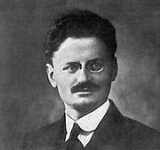
Expropriation
Encyclopedia
Expropriation is the politically motivated and forceful confiscation
and redistribution
of private property
outside the common law
. Unlike eminent domain
or laws regulating the foreign investment
, expropriation takes place outside the common law
and may be used to denote an armed robbery by revolutionaries. The term appears as "expropriation of expropriators (ruling class
es)" in marxist theory
, and also as the slogan "Loot the looters!", very popular during Russian October Revolution
.
The term is also used to describe nationalization
campaigns by communist states, such as dekulakization
and collectivization in the USSR , and as some form of justification for robberies by revolutionaries such as by Joseph Stalin
and Kamo
in the USSR.
Confiscation
Confiscation, from the Latin confiscatio 'joining to the fiscus, i.e. transfer to the treasury' is a legal seizure without compensation by a government or other public authority...
and redistribution
Redistribution
-Economics:* Redistribution in relation to non-market economic exchange* Redistribution , redistribution of income, property and/or wealth* Redistributive change, theory of economic justice in U.S...
of private property
Private property
Private property is the right of persons and firms to obtain, own, control, employ, dispose of, and bequeath land, capital, and other forms of property. Private property is distinguishable from public property, which refers to assets owned by a state, community or government rather than by...
outside the common law
Common law
Common law is law developed by judges through decisions of courts and similar tribunals rather than through legislative statutes or executive branch action...
. Unlike eminent domain
Eminent domain
Eminent domain , compulsory purchase , resumption/compulsory acquisition , or expropriation is an action of the state to seize a citizen's private property, expropriate property, or seize a citizen's rights in property with due monetary compensation, but without the owner's consent...
or laws regulating the foreign investment
Bilateral Investment Treaty
A bilateral investment treaty is an agreement establishing the terms and conditions for private investment by nationals and companies of one state in another state. This type of investment is called foreign direct investment . BITs are established through trade pacts...
, expropriation takes place outside the common law
Common law
Common law is law developed by judges through decisions of courts and similar tribunals rather than through legislative statutes or executive branch action...
and may be used to denote an armed robbery by revolutionaries. The term appears as "expropriation of expropriators (ruling class
Ruling class
The term ruling class refers to the social class of a given society that decides upon and sets that society's political policy - assuming there is one such particular class in the given society....
es)" in marxist theory
Marxism
Marxism is an economic and sociopolitical worldview and method of socioeconomic inquiry that centers upon a materialist interpretation of history, a dialectical view of social change, and an analysis and critique of the development of capitalism. Marxism was pioneered in the early to mid 19th...
, and also as the slogan "Loot the looters!", very popular during Russian October Revolution
October Revolution
The October Revolution , also known as the Great October Socialist Revolution , Red October, the October Uprising or the Bolshevik Revolution, was a political revolution and a part of the Russian Revolution of 1917...
.
The term is also used to describe nationalization
Nationalization
Nationalisation, also spelled nationalization, is the process of taking an industry or assets into government ownership by a national government or state. Nationalization usually refers to private assets, but may also mean assets owned by lower levels of government, such as municipalities, being...
campaigns by communist states, such as dekulakization
Dekulakization
Dekulakization was the Soviet campaign of political repressions, including arrests, deportations, and executions of millions of the better-off peasants and their families in 1929-1932. The richer peasants were labeled kulaks and considered class enemies...
and collectivization in the USSR , and as some form of justification for robberies by revolutionaries such as by Joseph Stalin
Joseph Stalin
Joseph Vissarionovich Stalin was the Premier of the Soviet Union from 6 May 1941 to 5 March 1953. He was among the Bolshevik revolutionaries who brought about the October Revolution and had held the position of first General Secretary of the Communist Party of the Soviet Union's Central Committee...
and Kamo
Kamo (Bolshevik)
Kamo, real name Semeno Aržakovitš Ter-Petrossian , was a Georgian revolutionary of Armenian descent, and an early companion to Soviet leader Joseph Stalin...
in the USSR.

